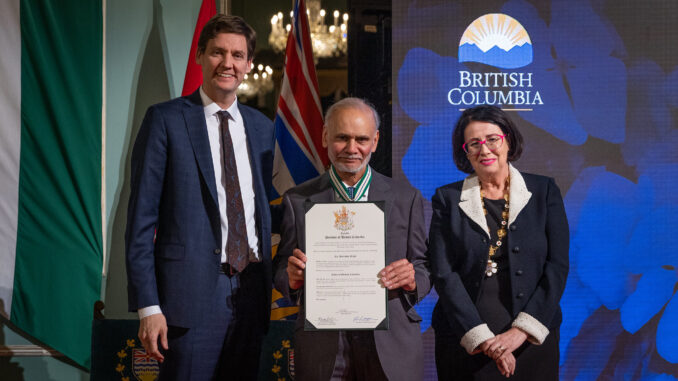
Harinder Mahil, the former commissioner of the British Columbia Human Rights Commission, and a regular contributor to The LINK newspaper, who has made pivotal contributions to the province, has received Order of British Columbia at a ceremony in Victoria last Thursday, December 1.
Mahil has been a strong defender of human rights, and has also made it his principle that “we all have the right not to be discriminated against, but also have the responsibility not to discriminate against others.”
He is continuing to educate about the rights and responsibilities afforded to all British Columbians regardless of race, colour, gender, creed, religion, sexual orientation, disability or income. Presently he is a board member of the South Asian Network for Secularism and Democracy (SANSAD), secretary of the Dr. Hari Sharma Foundation and president of the West Coast Coalition Against Racism (WCCAR).
“I am extremely humbled by this honour and believe that a positive change can only be made by organizing. Therefore, I have always worked in organizations whether they are trade unions, anti-racism coalitions or community associations. I believe this honour is for all activists who are trying to make this world a better place and to improve the lives of all human beings. I am pleased to be sharing this honour with many activists,” he said.
A Coquitlam resident, When Mahil immigrated to B.C. in 1970 at the age of 19, he was only able to get farming jobs in Abbotsford and the surrounding areas, his biography on the BC government page read.
His desire to build a better life here led him to work long hours and look past the unnecessary clawbacks from labour contractors taking advantage of the immigrant workforce. Mahil felt for the older workers in their 60s for the working conditions they had to endure, and he told himself he would do something to make lives better for everyone. His organizing efforts and activism to end workers’ exploitation led to major changes in B.C.’s Employment Standards Act, which saw the inclusion of farm workers in protections afforded by the act. It also led to the formation of the Canadian Farmworkers’ Union.
After a variety of farming jobs, Mahil was able to secure work in a sawmill, which eventually led him to a role as an Industrial, Wood and Allied workers (IWA) staff member and activist, making it his mission to work together with others to improve lives of sawmill workers.
Mahil stepped up in the 1980s and was one of the fearless leaders who fought back against the influx of the Ku Klux Klan becoming established in B.C. He was one of the founders of the B.C. Organization to Fight Racism, an organization that challenged hate. The anti-racism group led to the creation of others that continue to this day.
Mahil worked for the B.C. Ministry of Labour from 1982-92 and for the B.C. human rights agencies from 1992 to 2002. He then worked for the Professional Institute of the Public Service of Canada as a labour relations professional.
For the past 50 years, Mahil has been a champion to improve the lives of others and make B.C. a better place. As a labour relations and human rights professional, he successfully resolved thousands of workplace disputes between workers and employers, represented union members, worked with labour and business organizations, and led labour task forces.
Mahil became the chair of the B.C. Council of Human Rights, the deputy chief commissioner and then the acting chief commissioner of the B.C. Human Rights Commission.

Leave a Reply